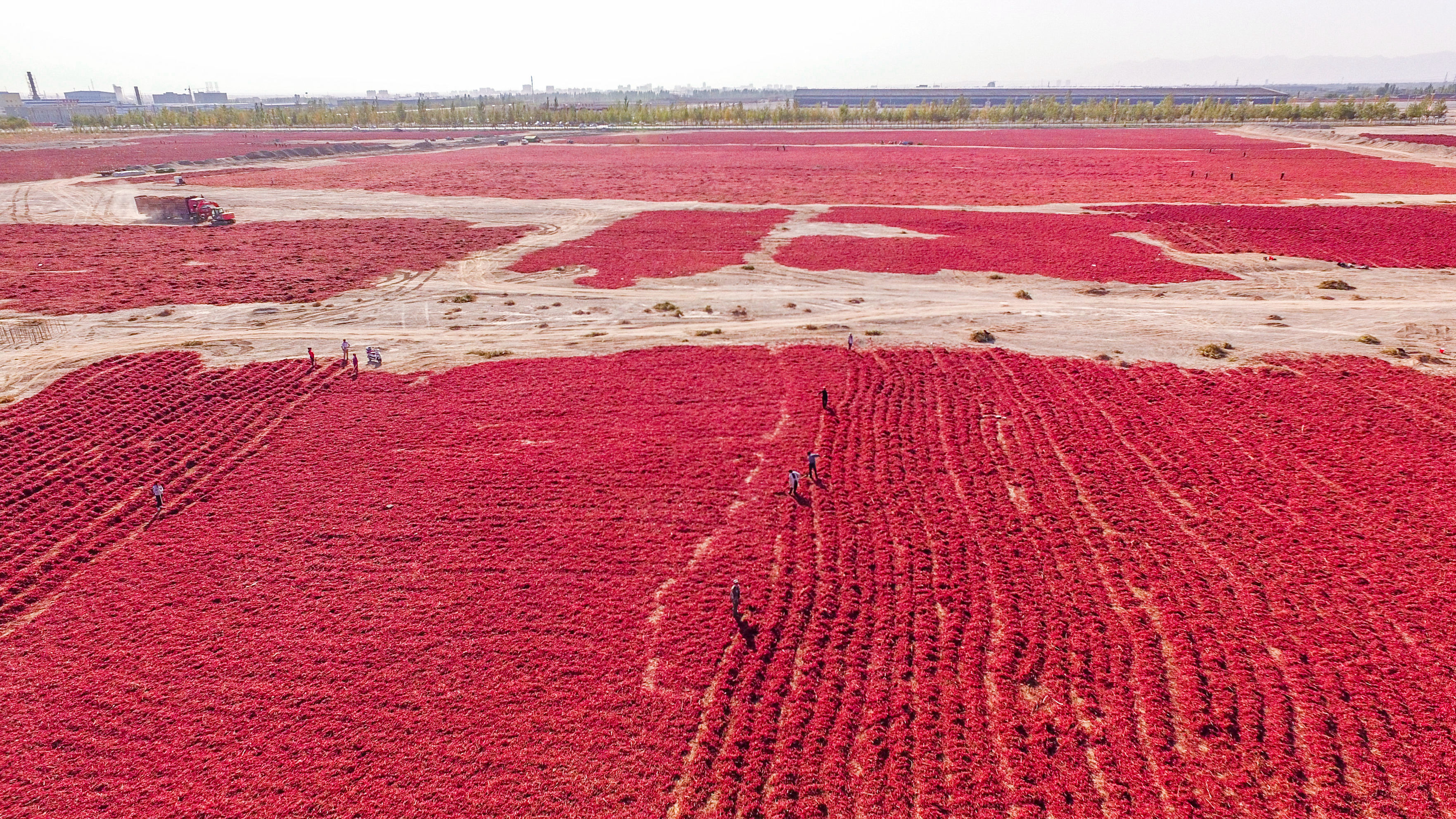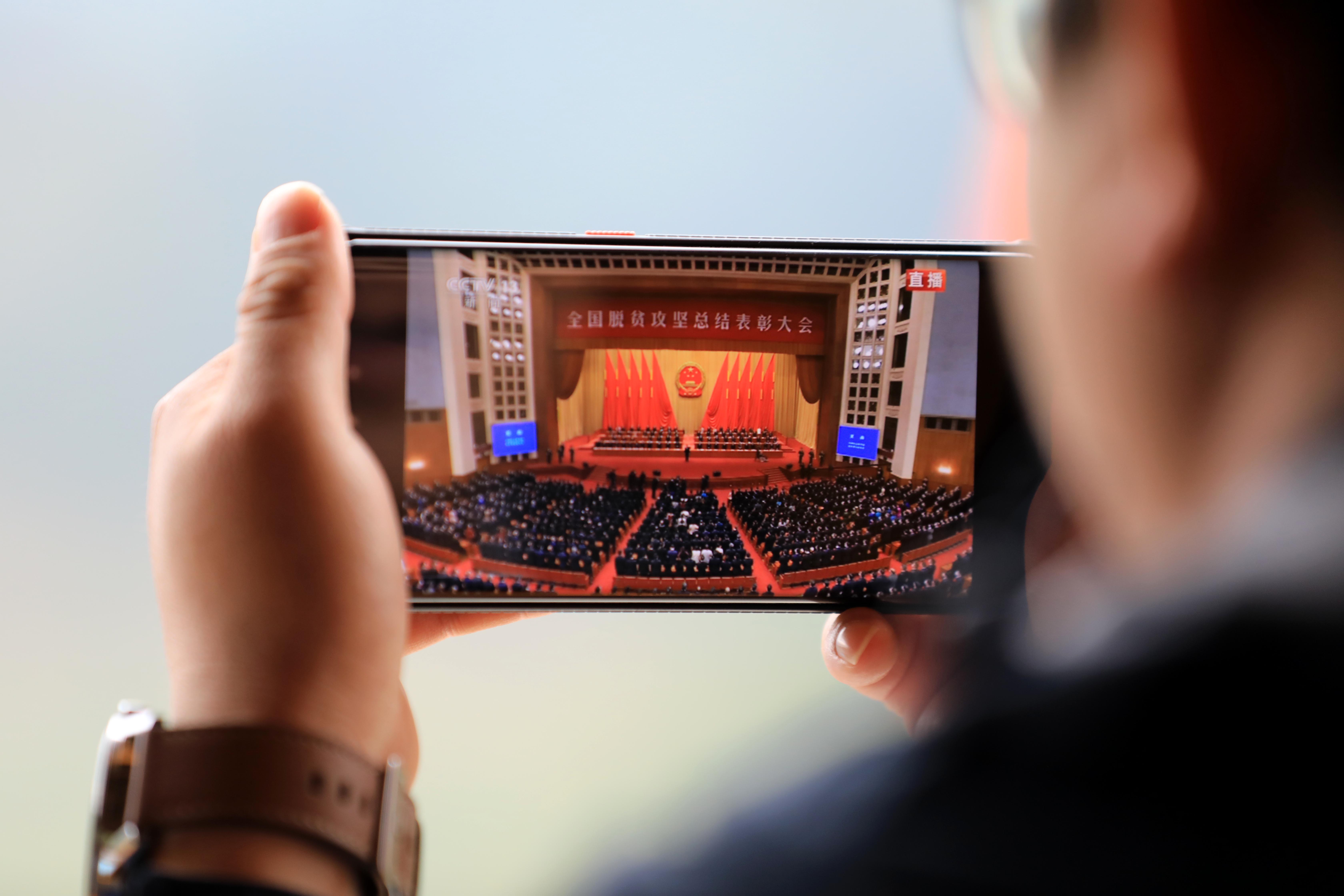
Farmers attend to peppers being drying in Kuqa City, Xinjiang Uygur Autonomous Region, northwest China, October 7, 2020. /Getty
Farmers attend to peppers being drying in Kuqa City, Xinjiang Uygur Autonomous Region, northwest China, October 7, 2020. /Getty
Editor's note: Stephen Ndegwa is a Nairobi-based communication expert, lecturer-scholar at the United States International University-Africa, author and international affairs columnist. The article reflects the author's opinions, and not necessarily the views of CGTN.
The official announcement in Beijing on Thursday by President Xi Jinping proclaiming "complete victory" against extreme poverty was as bold as the feat itself. Equating the achievement to a "miracle" of historical significance, Xi declared that "the country has created a 'China example' of poverty reduction and made great contributions to global poverty alleviation."
By reaching the milestone, China has contributed to the eradication of poverty in the world by 70 percent for the fact that the country has the largest population in the world. Further, this is also a landmark for the first goal of the United Nations Sustainable Development Goals (SDGs), which seeks to "end poverty by all its forms everywhere." Indeed, the UN SDGs priority actions against poverty eradication are straight out of China's all-encompassing strategic handbook against the challenge.
Amid the economic matrices, poverty ranks top among human rights abuses because of its dehumanizing effect. No country can claim to respect human life in all its forms while a section of its population is plagued by deficiencies. For instance, the democratic system has such a veneer where unbridled freedom is used as camouflage for swathes of economically disenfranchised people.
Poverty is not about statistics. It involves human life, millions of people who cannot afford the mere basics to sustain a decent life. Furthermore, poverty cannot be won through proxy, which has been the main reason for stagnation for those who have endeavored to get out of the vicious cycle for longer than China. Leadership, as Xi has clearly shown, is key. It is about all, regardless of social status, office or vocation, rolling up their sleeves and doing the "dirty" work.
However, contrary to popular belief, poverty is not the preserve of developing countries. For instance, poverty is rife even in the U.S., which is the largest economy in the world. In a Town Hall meeting earlier this month, U.S. President Joe Biden stated that "if you're making less than $15 an hour, you're living below the poverty wage."
These sentiments echo Biden's views as far back as October 7, 2014 when as vice president he stated that "no one in America should be working 40 hours a week and living below the poverty level," while talking to business owners in Los Angeles on the importance of raising the minimum wage.

A village official watches a live broadcast of a national poverty alleviation conference in Liuzhou, south China's Guangxi Zhuang Autonomous Region, February 25, 2021. /Getty
A village official watches a live broadcast of a national poverty alleviation conference in Liuzhou, south China's Guangxi Zhuang Autonomous Region, February 25, 2021. /Getty
Indeed, the fight against poverty forms one of the pranks of the current heated debate for and against Biden's $1.9-trillion Rescue Plan which is expected to cushion the poor in the U.S. against the vagaries of the pandemic.
Disguised poverty is one of the greatest injustices and dark side of capitalism. The fact that such a super-charged economy can still be associated with poverty bespeaks of a system that rewards brawn at the expense of working towards universal welfare. China has shattered the widely held assumption that there is no poverty in the developed world – that lack is exclusive to developing or poor countries.
Like any other war, fighting poverty is not without great sacrifices and casualties. In the Beijing event, Xi noted that more than 1,800 workers lost lives for the country's cause of poverty alleviation. This includes people who died while performing high risk or dangerous jobs so others can benefit. A selfish system that seldom values humanity cannot have such martyrs because it is usually a case of everyone for his own and God for us all.
China has set a perfect example for other developing countries to emulate, especially those who often view poverty as fate, while others have actually been led to glorifying it as a sign of humility. But there is no dignity to poverty and it behooves any government worth its salt to do all it takes to lift its people out of the malaise.
Those who condemn China for the "re-education" campaign in Xinjiang Uygur Autonomous Region fail to tell the true story of the economic empowerment and transformation of region through multi-pronged programs that attack poverty at its core. These include creation of healthy ecosystems, law-based governance, inclusion as a core part of the Silk Road Economic Belt and lately measures containing the pandemic.
But to those who are more endowed, more is expected of them. China's success indicates that, in the spirit of a shared future for mankind, it pulls along others from dire need. Obviously, this comprises countries of the south, who need a similar paradigm shift in their poverty alleviation efforts.
Projects like the Belt and Road Initiative are already fulfilling this role with the myriad projects spread globally. Poor countries just need to tap into the pipeline and take full advantage of the access to world's trading routes that the opening up is offering.
(If you want to contribute and have specific expertise, please contact us at opinions@cgtn.com)

